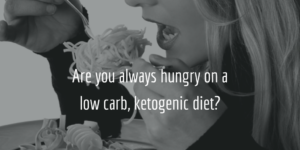
Those of you who know me in person know that I am a fan of the appropriate application of ketogenic diets. But only when they allow the individual to achieve their goal. Controlling hunger is one of those goals.
For many folks, a ketogenic diet does help in this way. But not in everyone.
Frequent trips back to the kitchen?
A little bit about satiety or that nice feeling that you have eaten enough in one sitting. Many of you out there suffer. Suffer from what I call “acceleration of the deterioration of your kitchen and pantry door hinge syndrome.”
You know exactly what I speak of. Despite your calculated, calorie and protein sufficient meal… you find yourself back in front of the fridge or pantry staring at all their contents. As you do so, you strongly engage your frontal cortex, telling yourself, “I had enough to eat! No mas!”
You win the first round and return to the couch. But the will of your internal community is strong. And you find yourself, once again, in combat in front of the fridge.
This continues a few more times until finally you cave. That batch of low carb dessert you made for the week- gone. Whatever it was, you ended up saying “ah, what the hell.” And instead of just getting enough to cover what you needed, you overate. Massively.
This is an unfortunate scenario that happens to many folks, frequently. Even those mindful of what they are eating. Why?
Satiety is about more than fat
There are several reasons. One is that your brain may not be getting as strong of an “I’m well-fed,” signal.
In the low carb and keto world, you have likely heard of cholecystokinin, a potent signal of satiety. A protein and fat rich meal causes its secretion from your intestines, and it synergizes with several other gut derived hormones to shut off feeding.
But note, it “synergizes” with other signals. Meaning more than one player exists in our story of feeling well fed. And like many other factors in nutrition, feeling well fed is an individual thing.
I cannot tell you how many times folks have told me, “I’m always hungry eating a ketogenic diet.” How could that be? Fat and particularly protein are so satiating!
Something simple you can try is to add about 20-30g of carbohydrate to your meal. I frequently suggest Larabars for convenience. The coconut cream pie and cashew cookie flavors are pretty badass.
This is NOT about calories. Oftentimes, folks report simply adding another handful of nuts or seeds, squirt of oil, another epic bar, helping of jerky or whatever- does not satiate them.
What does this mean for you?
There are players on the satiety stage that are secreted primarily in response to carbohydrate! One is the hormone insulin. And another interesting guy called amylin. Sometimes, a small bit of starch or sugar is all it takes.
Substituting 10-15 grams of fat in your meal for an equivalent amount of calories from carbohydrate may be all you need. Some options include
1 Larabar
A piece of fruit (apple, banana or pear)
Half cup cooked rice
Medium sized potato or yam
Half a cup of cooked beans
Low fat diets are certainly faulty. Cholecyestokinin is important! But don’t forget about amylin and insulin!
A lack of these signals during and post feeding can ruin the door hinges of your fridge and pantry prematurely!
A final note!
Please understand that I am NOT advocating a high carbohydrate diet. This is simply a strategy that can help you adopt a lower carbohydrate approach if the most severe form of carbohydrate restriction is failing you.
Rather than completely abandon ship, you can still derive benefit from a less restrictive approach! With a typical eating pattern, applying this strategy would net you 60-90 grams of nonfiber carbohydrate per day. Likely low enough to take stress off of disordered glycolytic machinery! Likely high enough to curb hunger in those struggling with a more restrictive approach!